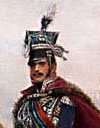Why do we play the games we play?
This question has come to mind recently again, due in part to my taking part in an online, play-by-e-mail (PBEM) game.
I am recalled to this discussion as it came up early in the design of some campaigns that I did for fellow table-top gamers in the 1990's.
There are many points I will touch on in the coming weeks about this subject and I wanted to open the discussion with just the simple question:
WHY?
I would love to read your views.
Subscribe to:
Post Comments (Atom)























































5 comments:
For mine, it is story, but with an emphasis on large narratives. Smaller stories are as compelling in their way - the stories of individuals prevailing in some conflict (which, by the way, need not be physically violent). But these must lie within the context of something larger. Wars are easier, because more involving, even if I don't ever want to be in a real one.
I guess the above also goes to why I like the Old School, refusing to abstract too far from the individual. I have never understood why anyone should take it upon himself, if I want an army level game, to tell me I can't have companies. Spare me.
Cheers,
Ion
So Ion,
Am I understanding correctly that you would like to play in a game that has, as its smallest tactical element, squads or files of 6-10 men and as the overall command have 50,000 to 100,000 men in total (or about 10,000 'tactical' units for you to keep track of and control) ??
Just getting a sense of what you may be aiming at.
Also, for your "why?"; I take it that the 'story' is important to you?
So Ion,
Am I understanding correctly that you would like to play in a game that has, as its smallest tactical element, squads or files of 6-10 men and as the overall command have 50,000 to 100,000 men in total (or about 10,000 'tactical' units for you to keep track of and control) ??
Just getting a sense of what you may be aiming at.
Also, for your "why?"; I take it that the 'story' is important to you?
The story's the thing for me as well. It helps if there are characters I can identify with (those can be individuals, but they can also be units or groups).
Ideally, MurdocK, yes. I would like that. We do run into problems of course - it's simply imnpractical. But there are two ways of going about this. One is to abstract out the lower levels to obtain a 'high command' sort of game; the other to stay with the low level.
I make several compromises myself. Let's talk Napoleonic. My Regiment/Battalions retain their company organisation, and there are times when company level actions will take place. But the higher formation are fudged such that an army corps comprises 6 or 8 foot units; a Cavalry unit or two, and some guns - a force of all arms.
To the objection that such an army corps is really a reinforced Division, I can only argue that so Army Corps became through wear and tear (look at the Union Corps at Gettysburg - on average not more than 11,000 all ranks (and arguably quite a bit less). But even without that consideration, I would argue that such a formation would lend itself quite happily to handling as an Army Corps. Having 2 or more of these, gives me an Army.
To the second question: yes. Story is probably the central motivation. In many ways the figures are simply a visual aid. Not only does one watch events unfold, but just the spectacle can be inspiring.
Cheers,
ion
Post a Comment